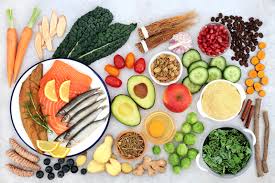Complete List of Anti-Inflammatory Foods you Should Know About
Let us discuss about the list of anti-inflammatory foods we have and how they affect our well-being. Inflammation helps the body fight illness and can protect it from harm. In most cases, it is a necessary part of the healing process.
However, some people have a medical condition in which the immune system does not work as it should. This malfunction can lead to persistent or recurrent low level inflammation.
Chronic inflammation occurs with various diseases, such as psoriasis, rheumatoid arthritis, and asthma. There is evidence that dietary choices may help manage the symptoms.
An anti-inflammatory diet favors fruits and vegetables, foods containing omega-3 fatty acids, whole grains, lean protein, healthful fats, and spices. It discourages or limits the consumption of processed foods, red meats, and alcohol.
The anti-inflammatory diet is not a specific regimen but rather a style of eating.
What are anti-inflammatory foods or diet?
Some foods contain ingredients that can trigger or worsen inflammation. Sugary or processed foods may do this, while fresh, whole foods are less likely to have this effect.
Inflammation can be both good and bad.
On one hand, it helps your body defend itself from infection and injury. On the other hand, chronic inflammation can lead to weight gain and disease.
Stress, inflammatory foods, and low activity levels can make this risk even greater.
However, studies demonstrate that some foods can fight inflammation.
An anti-inflammatory diet focuses on fresh fruits and vegetables. Many plant-based foods are good sources of antioxidants. Some foods, however, can trigger the formation of free radicals. Examples include foods that people fry in repeatedly heated cooking oil.
Dietary antioxidants are molecules in food that help remove free radicals from the body. Free radicals are the natural byproducts of some bodily processes, including metabolism. However, external factors, such as stress and smoking, can increase the number of free radicals in the body.
Free radicals can lead to cell damage. This damage increases the risk of inflammation and can contribute to a range of diseases.
The body creates some antioxidants that help it remove these toxic substances, but dietary antioxidants also help.
An anti-inflammatory diet favors foods that are rich in antioxidants over those that increase the production of free radicals.
Omega-3 fatty acids, which are present in oily fish, may help reduce the levels of inflammatory proteins in the body. Fiber can also have this effect, according to the Arthritis Foundation.
Complete List of Anti-Inflammatory Foods you Should Know About
Now let us discuss about the complete list of anti-inflammatory foods we have and their contents:
1. Berries
Berries are small fruits that are packed with fiber, vitamins, and minerals.
Although dozens of varieties exist, some of the most common include:
- strawberries
- blueberries
- raspberries
- blackberries
Berries contain antioxidants called anthocyanins. These compounds have anti-inflammatory effects that may reduce your risk of disease.
Your body produces natural killer cells (NK cells), which help keep your immune system functioning properly.
In one study in men, those who consumed blueberries every day produced significantly more NK cells than those who did not.
In another study, adults with excess weight who ate strawberries had lower levels of certain inflammatory markers associated with heart disease.
Summary Berries provide antioxidants known as anthocyanins. These compounds may reduce inflammation, boost immunity, and reduce your risk of heart disease.
2. Fatty fish
Fatty fish are a great source of protein and the long-chain omega-3 fatty acids EPA and DHA.
Although all types of fish contain some omega-3 fatty acids, these fatty fish are among the best sources:
- salmon
- sardines
- herring
- mackerel
- anchovies
EPA and DHA reduce inflammation that can lead to metabolic syndrome, heart disease, diabetes, and kidney disease.
Your body metabolizes these fatty acids into compounds called resolvins and protectins, which have anti-inflammatory effects.
Studies have found that people consuming salmon or EPA and DHA supplements experienced reductions in the inflammatory marker C-reactive protein (CRP)
However, in another study, people with an irregular heartbeat who took EPA and DHA daily experienced no difference in inflammatory markers, compared with those who received a placebo.
Summary Fatty fish boast high amounts of the omega-3 fatty acids EPA and DHA, which have anti-inflammatory effects.
3. Broccoli
Broccoli is extremely nutritious.
It’s a cruciferous vegetable, along with cauliflower, Brussels sprouts, and kale.
Research has shown that eating a lot of cruciferous vegetables is associated with a decreased risk of heart disease and cancer.
This may be related to the anti-inflammatory effects of the antioxidants they contain.
Broccoli is rich in sulforaphane, an antioxidant that fights inflammation by reducing your levels of cytokines and NF-kB, which drive inflammation.
Summary Broccoli is one of the best sources of sulforaphane, an antioxidant with powerful anti-inflammatory effects.
4. Avocados
Avocados may be one of the few supposed superfoods worthy of the title.
They’re packed with potassium, magnesium, fiber, and heart-healthy monounsaturated fats.
They also contain carotenoids and tocopherols, which are linked to reduced cancer risk.
In addition, one compound in avocados may reduce inflammation in young skin cells.
In one study, when people consumed a slice of avocado with a hamburger, they had lower levels of the inflammatory markers NF-kB and IL-6, compared with participants who ate the hamburger alone.
Summary Avocados offer various beneficial compounds that protect against inflammation and may reduce your cancer risk.
5. Green tea
You’ve probably heard that green tea is one of the healthiest beverages you can drink.
It reduces your risk of heart disease, cancer, Alzheimer’s disease, obesity, and other conditions.
Many of its benefits are due to its antioxidant and anti-inflammatory properties, especially a substance called epigallocatechin-3-gallate (EGCG).
EGCG inhibits inflammation by reducing pro-inflammatory cytokine production and damage to the fatty acids in your cells.
You can buy green tea in most stores or online.
Summary Green tea’s high EGCG content reduces inflammation and safeguards your cells from damage that can lead to disease.
Read Also: Complete List of Iron Rich Foods you Should Know About
6. Peppers
Bell peppers and chili peppers are loaded with vitamin C and antioxidants that have powerful anti-inflammatory effects.
Bell peppers provide the antioxidant quercetin, which may reduce one marker of oxidative damage in people with sarcoidosis, an inflammatory disease.
Chili peppers contain sinapic acid and ferulic acid, which may reduce inflammation and lead to healthier aging.
Summary Chili peppers and bell peppers are rich in quercetin, sinapic acid, ferulic acid, and other antioxidants with strong anti-inflammatory effects.
7. Mushrooms
While thousands of varieties of mushrooms exist worldwide, only a few are edible and grown commercially.
These include truffles, portobello mushrooms, and shiitake.
Mushrooms are very low in calories and rich in selenium, copper, and all of the B vitamins.
They also contain phenols and other antioxidants that provide anti-inflammatory protection.
A special type of mushroom called lion’s mane may potentially reduce low-grade, obesity-related inflammation.
However, one study found that cooking mushrooms lowered their anti-inflammatory compounds significantly. Thus, it may be best to eat them raw or lightly cooked.
Summary Some edible mushrooms boast compounds that may decrease inflammation. Eating them raw or lightly cooked may help you reap their full anti-inflammatory potential.
8. Grapes
Grapes contain anthocyanins, which reduce inflammation.
In addition, they may decrease the risk of several diseases, including heart disease, diabetes, obesity, Alzheimer’s, and eye disorders.
Grapes are also one of the best sources of resveratrol, another compound that has many health benefits.
In one study, people with heart disease who consumed grape extract daily experienced a decrease in inflammatory gene markers, including NF-kB.
What’s more, their levels of adiponectin increased. Low levels of this hormone are associated with weight gain and an increased risk of cancer.
Summary Several plant compounds in grapes, such as resveratrol, can reduce inflammation. They may also reduce your risk of several diseases.
9. Turmeric
Turmeric is a spice with a strong, earthy flavor that’s often used in curries and other Indian dishes.
It has received a lot of attention for its content of curcumin, a powerful anti-inflammatory nutrient.
Turmeric reduces inflammation related to arthritis, diabetes, and other diseases.
In fact, consuming 1 gram of curcumin daily combined with piperine from black pepper caused a significant decrease in the inflammatory marker CRP in people with metabolic syndrome.
However, it may be hard to get enough curcumin to experience a noticeable effect from turmeric alone.
In one study, women with excess weight who took 2.8 grams of turmeric per day showed no improvement in inflammatory markers.
Taking supplements containing isolated curcumin is much more effective. Curcumin supplements are often combined with piperine, which can boost curcumin absorption by 2,000%.
If you’re interested in using turmeric in cooking, you can find it in most grocery stores or online.
Summary Turmeric contains a powerful anti-inflammatory compound called curcumin. Eating black pepper with turmeric can significantly enhance the absorption of curcumin.
10. Extra virgin olive oil
Extra virgin olive oil is one of the healthiest fats you can eat.
It’s rich in monounsaturated fats and a staple in the Mediterranean diet, which provides numerous health benefits.
Studies link extra virgin olive oil to a reduced risk of heart disease, brain cancer, and other serious health conditions.
In one study on the Mediterranean diet, CRP and several other inflammatory markers significantly decreased in those who consumed 1.7 ounces (50 ml) of olive oil daily.
The effect of oleocanthal, an antioxidant found in olive oil, has been compared to anti-inflammatory drugs like ibuprofen.
Keep in mind that extra virgin olive oil offers greater anti-inflammatory benefits than those provided by more refined olive oils.
It’s easy to find extra virgin olive oil at your local grocery store, but you can also buy it online.
Summary Extra virgin olive oil provides powerful anti-inflammatory benefits, which may reduce your risk of heart disease, cancer, and other serious health conditions.
11. Dark chocolate and cocoa
Dark chocolate is delicious, rich, and satisfying.
It’s also packed with antioxidants that reduce inflammation. These may reduce your risk of disease and lead to healthier aging.
Flavanols are responsible for chocolate’s anti-inflammatory effects and keep the endothelial cells that line your arteries healthy.
In one study, smokers experienced significant improvements in endothelial function within 2 hours of eating high-flavonol chocolate.
However, make sure to choose dark chocolate that contains at least 70% cocoa a greater percentage is even better to reap these anti-inflammatory benefits.
If you forgot to grab this treat on your last run to the store, you can always buy it online.
Summary Flavanols in dark chocolate and cocoa can reduce inflammation. They may also reduce your risk of several diseases.
Read Also: Complete List of High Fiber Foods you Should Know About
12. Tomatoes
The tomato is a nutritional powerhouse.
Tomatoes are high in vitamin C, potassium, and lycopene, an antioxidant with impressive anti-inflammatory properties.
Lycopene may be particularly beneficial for reducing pro-inflammatory compounds related to several types of cancer.
One study determined that drinking tomato juice significantly decreased inflammatory markers in women with excess weight but not those with obesity.
Note that cooking tomatoes in olive oil can maximize the amount of lycopene you absorb.
That’s because lycopene is a carotenoid, a nutrient that’s better absorbed with a source of fat.
Summary Tomatoes are an excellent source of lycopene, which may reduce inflammation and protect against cancer.
13. Cherries
Cherries are delicious and rich in antioxidants, such as anthocyanins and catechins, which fight inflammation.
Although the health-promoting properties of tart cherries have been studied more than other varieties, sweet cherries also provide benefits.
In one study, when people consumed 280 grams of cherries per day for 1 month, their levels of the inflammatory marker CRP decreased and stayed low for 28 days after they stopped eating cherries.
Summary Sweet and tart cherries contain antioxidants that reduce inflammation and your risk of disease.
Inflammatory foods
In addition to filling your diet with nutritious anti-inflammatory ingredients, it’s important to limit your consumption of foods that can promote inflammation.
For example, processed foods like fast food, frozen meals, and processed meats have been associated with higher levels of inflammatory markers like CRP.
Meanwhile, fried foods and partially hydrogenated oils contain trans fats, a type of unsaturated fatty acid that has also been linked to increased levels of inflammation.
Other foods like sugar-sweetened beverages and refined carbs have likewise been shown to promote inflammation.
Here are some examples of foods that have been linked to increased levels of inflammation:
- Junk foods: fast food, convenience meals, potato chips, pretzels
- Refined carbohydrates: white bread, pasta, white rice, crackers, flour tortillas, biscuits
- Fried foods: french fries, donuts, fried chicken, mozzarella sticks, egg rolls
- Sugar-sweetened beverages: soda, sweet tea, energy drinks, sports drinks
- Processed meats: bacon, beef jerky, canned meat, salami, hot dogs, smoked meat
- Trans fats: shortening, partially hydrogenated vegetable oil, margarine
Summary Certain ingredients like sugar-sweetened beverages, processed foods, fried foods, and partially hydrogenated fats can increase levels of inflammation in the body.
The bottom line
Even low levels of inflammation on a chronic basis can lead to disease.
Do your best to keep inflammation in check by choosing a wide variety of delicious, antioxidant-rich foods.
Peppers, dark chocolate, fish, and extra virgin olive oil are just a few foods that can help you combat inflammation and reduce your risk of illness.




